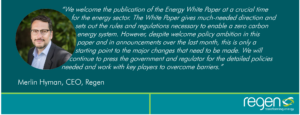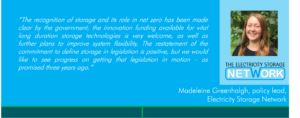The release of the Energy White Paper, after over 18 months of delay, is the vital next step to provide the policy detail on the ambitions set out in the 10 Point Plan, Spending Review and National Infrastructure Strategy.

Whilst the paper is lengthy and covers a lot of ground, many of the major announcements are not new and there is little decisive action that does not require more lengthy consultation periods.
However, the Energy White Paper is just the start of a long period of reshaping the energy sector – the last white paper was still being implemented several years after its publication. It’s important that we look ahead to the long term and how we want to influence through open doors in the paper and push hard for change where those doors appear to be closed.
We have identified five key areas where further concrete action that should be taken:
- Renewables. The White Paper has a welcome commitment to the role of wind and solar, however policy measures are focused heavily on offshore wind. Action is also required to reduce barriers to onshore wind and solar if we are to attract the £100bns of investment required.
- Energy governance and infrastructure. The commitment to set a clearer policy direction for Ofgem is much needed. Ofgem need to focus on decarbonisation in distribution network price controls and the outcome of the proposed Strategy Statement must result in a change to Ofgem’s regulatory remit in legislation to focus on decarbonisation alongside consumer cost.
- Heat. We are lacking detail for how the target for 600,000 heat pumps will be achieved. Regen is calling for the Treasury to shift energy levies from electricity to gas bills to reflect carbon emissions. The Future Homes Standard must be quickly finalised and put into place to ensure all new homes are net zero by 2023.
- Markets. The commitment to review how the electricity market functions in a net zero world is welcome. With decarbonisation as a fundamental goal of the system, we need a transparent view of the carbon intensity of all our markets, and to value low carbon assets for their role in decarbonisation, not just their cost.
- Smart Systems. The commitments to a new Smart Systems Plan, to define storage in legislation and to support long duration are very welcome. The new plan should focus on ensuring the Electricity System Operator and Distribution System Operators develop open markets that low carbon sources of flexibility, such as storage, can access.
This is a particularly important piece of policy for storage which is reliant on relatively niche energy system changes which don’t get a mention in higher level plans. See our ESN member update for further storage analysis.

